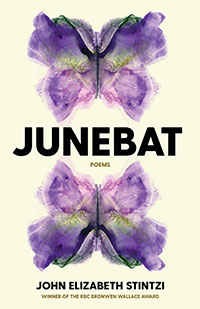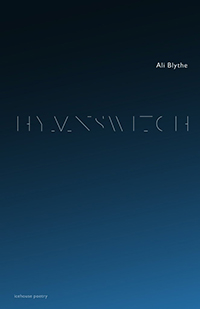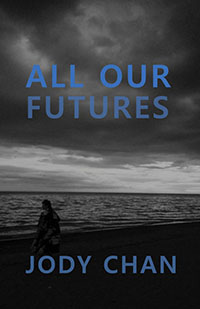Reviews
Poetry Reviews by Daniel Sarah Karasik
Ali Blythe, Hymnswitch (Fredericton: Goose Lane, 2019). Paperbound, 72 pp., $19.95.
Jody Chan, all our futures ([n.p.]: Pank Books, 2020). Paperbound, 32 pp., $US12.
John Elizabeth Stintzi, Junebat (Toronto: Anansi, 2020). Paperbound, 96 pp., $19.95.
 What are the politics of a poetics of paradox? I kept returning to this question, itself a kind of koan, as I read John Elizabeth Stintzi’s elegant,
What are the politics of a poetics of paradox? I kept returning to this question, itself a kind of koan, as I read John Elizabeth Stintzi’s elegant,
moving debut poetry collection, Junebat. Stintzi and I are both nonbinary trans writers; we’re online pals who have met in person once.
As Stintzi mentions in their book’s acknowledgements, I shared their poem “Evidence Disproving the Existence of a Junebat” with the attendees of the #TakeBackTPL read-in protest against transphobia in October 2019, an event that celebrated the work of Two-Spirit and
trans and non-binary authors in the face of the decision by Toronto’s public library system to host a speaker notorious for her views hostile to trans people.
It’s a lovely poem, and it served as a wonderful surfacing of nonbinary trans experience at that protest. It parses with wit the ambiguities of occupying an in-between space of identity, a category constituted through its rejection or elision of normative categories. “Maybe you are gay,” the poem’s speaker reflects, grasping after articulations of identity that have been normalized (and commodified) enough to feel stably inhabitable. “Gayness is real now.” The poem concludes with a stirring negation of the doubts it’s catalogued: “COUNTERPOINT: / I am still everything I think I am not.”
Paradox recurs in Junebat as both central formal device and key thematic concern. A pair of poems, “Apophatic Junebat” and “Cataphatic Junebat,” apply theological methods of description by negation and affirmation to define the concept “Junebat,” arriving at spectral definitions: a Junebat either is or is not “a cluster / a careful thing / a word.” While sometimes the Junebat seems a straightforward proxy
for non-binary gender (“you have only recently begun to identify as a Junebat!”), it also expresses forms of paradox that transcend gender, as in Stintzi’s many riffs on Wallace Stevens. In “Thirteen Ways of Looking at a Junebat,” which re-imagines Stevens’s “Thirteen Ways of Looking at a Blackbird,” the Junebat is that which “has always / and has never been before… / an indecipherable clause.” Later, these poems’ speaker—who may or may not be a Junebat—is defined as “a question without need / of an answer… / a symptom without need / of a sickness.” The Junebat’s paradoxes are both source of suffering and promise of transformation, pointing “a way out / of the body / who swallowed you.”
Interpreted as a claim about the plasticity of the individual gendered body and its consciousness, this is a hopeful impulse. But what’s the way out when the body who swallowed you is history? What, again, is the relationship between paradox, as both poetic device and lived reality, and politics? At its best, Junebat can feel like a literary version of a protest: making visible a public often invisibilized by its contradictions, celebrating that public’s particularities and declaring its right to be seen, singing its power to itself. Yet that protest’s power may tend to be constrained when its method of paradoxical introspection abstracts it from the history, the struggle of social forces, exploding all around it.
Poems towards the end of Junebat begin to push beyond that limit: in “On the Murder of Junebats,” the speaker acknowledges “the whiteness of my skin … how I do not need / to fuck someone who could kill me legally / just to eat and make rent.” “The night America took off her mask,” presumptively Donald Trump’s election in 2016, is represented as a catalyst for the speaker’s fuller embrace of their queerness, their decision that “like a true American Nazi / I could drop my mask and live life alive.” But Junebat signs off as it’s just beginning to investigate how the gap might be bridged between the potentially (though not inevitably) liberatory visibility of “[painted] nails, bright and tiny nodes of resistance” and effective collective confrontation with power, gendered but also, crucially, raced and classed: how the protest is translated into the riot or the strike, becomes not only the way we perform our power to ourselves, important as that is, but also a way we mobilize that power to remake the world. I’m excited to see how Stintzi brings their emotional generosity and technical precision to bear on those questions in their next book: what songs they offer tomorrow’s read-ins for trans life.
 Strategies of paradox, crystalline hermetic eloquences, are likewise on display in Ali Blythe’s second poetry collection, Hymnswitch. Like Stintzi’s, Blythe’s new poems conjure trans experience as almost-but-not-quite sayable—while suffusing everything. “I am always on the lookout / for smallish men // like me,” Blythe writes with a characteristic light touch in “But First, the Paperwork.” Living in “this, the golden-throated era / of the hormone,” gender is identity and desire, being and doing in indefinite proportions: “I perform again and again. / I am not a performance.” The obliquity with which this work marks gender feels like a kind of political humility, restraint: here are no explicit claims about transness as a vehicle for liberation. Instead, gender—and masculinity in particular—is evoked in these poems as primarily a modality of suffering: a worldly form that mediates the unworlding or reworlding pains of love, alienation, and addiction.
Strategies of paradox, crystalline hermetic eloquences, are likewise on display in Ali Blythe’s second poetry collection, Hymnswitch. Like Stintzi’s, Blythe’s new poems conjure trans experience as almost-but-not-quite sayable—while suffusing everything. “I am always on the lookout / for smallish men // like me,” Blythe writes with a characteristic light touch in “But First, the Paperwork.” Living in “this, the golden-throated era / of the hormone,” gender is identity and desire, being and doing in indefinite proportions: “I perform again and again. / I am not a performance.” The obliquity with which this work marks gender feels like a kind of political humility, restraint: here are no explicit claims about transness as a vehicle for liberation. Instead, gender—and masculinity in particular—is evoked in these poems as primarily a modality of suffering: a worldly form that mediates the unworlding or reworlding pains of love, alienation, and addiction.
Addiction and recovery are Hymnswitch’s driving themes. Early in the collection, several poems adopt an understated confessional form—inflected with the surreal non-sequitur, the associative leap into myth—to document addiction recovery as a process. In “The Program,” the poem’s speaker and his companions struggle towards
sobriety by conducting “fierce inventories”: of masculinities (“I don’t see many dresses. / No lovers allowed. / I concentrate on boots. / Boots, boots, eyes, boots.”); triggers (“The desire to erase oneself”); and stress responses like “Freeze’s / monstrous relation, Dissociate.” Later, in poems like “Forge,” that process is rendered as private and hopeful: “drinking coffee / that is nearly too strong / for my own good,” the speaker finds that “newly, / I wish this life / to always be mine.” The
poem concludes with a plea wrought in gorgeous music, a longing for earthly fulfillment hushed into fervent monosyllabic iambs, punched up by the spondee of draws near: “Please point me / to a religion with no hope / for union so love for life / draws near for good.”
Yet love for life seems already a steady presence in Blythe’s poetry, whether as a consolation snatched out of the teeth of loss, like in Hymnswitch, or as a dangerous but magnetic eroticism, like in Blythe’s first poetry collection, Twoism. The tonal shift between the two books is dramatic. Where Twoism compresses fizzing desire into a staccato mythic-demotic, showcasing “A young Hermaphroditus / undressing
in the pool” (“I become heavenly. / Come heavily.”), Hymnswitch documents the struggle to discipline that desire into a maturity checkered with grief but survivable: “a new tone / of acceptance // and camaraderie / that sounds in my ears / like the finest, saddest / harmonica.” Yet this maturity is also lightly ironized: when the speaker of “Waking in the Preceding” proposes that “we will become // happy, satisfied and uplifted / communications professionals,” it’s hard not to hear a note of ambivalence over the loss of vitality, of “using // risk erotically,” that such a life development might entail.
Together and individually, Blythe’s two poetry collections stage a kind of dialectics of desire and repudiation, where each principle contains the other and thereby produces paradox as theme and form. “Oh religion, go away, / stop reminding us of everything,” Blythe writes in Twoism; in Hymnswitch, he issues the prayer above (“Please point me / to a religion with no hope / for union…”) to call the exiled spirit
back, but with the demand that it be made compatible with life. What persists through that cycle of desire and repudiation are its objects. Religion (including Greco-Roman myth and cult), love, the body and person translated by desire: these remain the centre of attention in Blythe’s poems, maintained as objects of ultimate concern, whether by negation or affirmation.
Perhaps for this reason, though Hymnswitch is distinct from Junebat in texture, it feels circumscribed by a similar boundary: while particularities like a “Men/Trans Men Welcome” sign on a bathroom door evoke an era, the book’s critical relationship to that history—its politics—remains largely unmarked. Blythe’s poems seem sometimes to suggest that personal transformation towards peace and wholeness may be one way to contest power, “let unprepared sounds // drown out / the great orchestration.” But power, in its social forms, remains generally an unnamed backdrop to those poems, which appear seldom to situate themselves critically within, for instance, whiteness, patriarchy, or capitalism. To be sure, the poems’ graceful obliquity may not lend itself to an explicit accounting of their social location. But it seems to me that their allusive, elusive method might fruitfully cast a bit more of its rare light on, for instance, the “painful / or more painful / cultural
circumstances”—which are also historical and social and economic circumstances—
that can press people towards addiction.
 Jody Chan’s all our futures loses no time in specifying such circumstances as they pertain to its poems’ main speaker: “assigned female at birth. not / white, but skin that, separate from / my body, could be mistaken for white. / … death-seeking body / born in Toronto to a family with wealth / enough for braces, inhalers, glasses.” Chan is a political organizer in Toronto as well as a poet—we’re comrades—so it’s no surprise that the taxonomy above mirrors the kind of introductions frequently offered in political movement spaces. But all our futures is much more than a political manifesto extrapolated from movement work. It’s a seamless blend of original political thought, nimble poetic craft, and raw feeling—proof that poetry can interrogate the full complexity of being alive in and to history, without sacrificing emotional power or loveliness of form.
Jody Chan’s all our futures loses no time in specifying such circumstances as they pertain to its poems’ main speaker: “assigned female at birth. not / white, but skin that, separate from / my body, could be mistaken for white. / … death-seeking body / born in Toronto to a family with wealth / enough for braces, inhalers, glasses.” Chan is a political organizer in Toronto as well as a poet—we’re comrades—so it’s no surprise that the taxonomy above mirrors the kind of introductions frequently offered in political movement spaces. But all our futures is much more than a political manifesto extrapolated from movement work. It’s a seamless blend of original political thought, nimble poetic craft, and raw feeling—proof that poetry can interrogate the full complexity of being alive in and to history, without sacrificing emotional power or loveliness of form.
In a suite of linked poems, Chan knits together a meditation on disability and madness (“what we call madness is // a strategy”), eugenics and its advocates (“I sterilize myself / in their voice”), and other intergenerational burdens (“a life is made of wrongs we inherit // to learn from, to eventually answer”). Their poetry asks about the ethics of making a future, raising a child, when climate disaster looms and grief has left deep wounds: “epigenetics says trauma changes life at its root, its most basic expression trauma: composted eggshells, a cotton dress hanging empty.” Genderqueerness shows up here as one important way a person may fall short of eugenicist notions of normalcy, may be a “disobedient / body”: “at the birth control clinic I learn / my pronouns do not exist, officially.” But Chan’s poems tend to emphasize, more than trans people’s characteristic vulnerabilities, our shared future’s totalizing catastrophes: “future child, will you be four / or five or fifteen when our sun’s / amplified fire distorts the ancient / schedules of birds?”
Sometimes the text takes the form of documentary prose, as in a section titled “a brief history of eradication,” which itemizes the progress of sterilization legislation in the Canadian state, deployed genocidally against Indigenous women as well as settlers with disabilities. More often, all our futures makes intuitive, flexible use of verse forms, like the untitled sonnet attributed to a descendant writing from 2056:
…at street level, an officer
for hire shoots at the shadows of children
who, quicker than water, pick sky flowers
for their mothers. free love is a new crime.
it slows down despair. the rich pay for time.
A gift to those struggling for a liveable future, Chan’s writing is distinguished by its generosity in acknowledging how exhaustion and despair are not the death of such struggle, but its necessary complement: “most days, I believe what we personally do / matters little, for how much life do we expect / … what difference does it make to make / one we personally can survive?” Yet for all its ambivalences, all our futures takes a side: against “they— / who rig the elections… / who approve the sterilizations… / who prefer their hands spotless… / whose vacation homes sometimes flood too.” From an imagined mid-twenty-first century, a voice counsels: “hope is no cure.” But, paradoxically, this qualified pessimism, urging collective struggle even in the absence of certainty, even when survival is far from assured,
breeds hope. A hope for comradeship: in which our paradoxes, the foundational contradictions of our lives, might be transformed into more than fraught compromises. Into flourishing, a commons. Home. “If the world were good, / who would we be?” Poetry’s communist horizon invites us to consider the possibility that somebody’s great-great-grandchild might find out.
—Daniel Sarah Karasik









